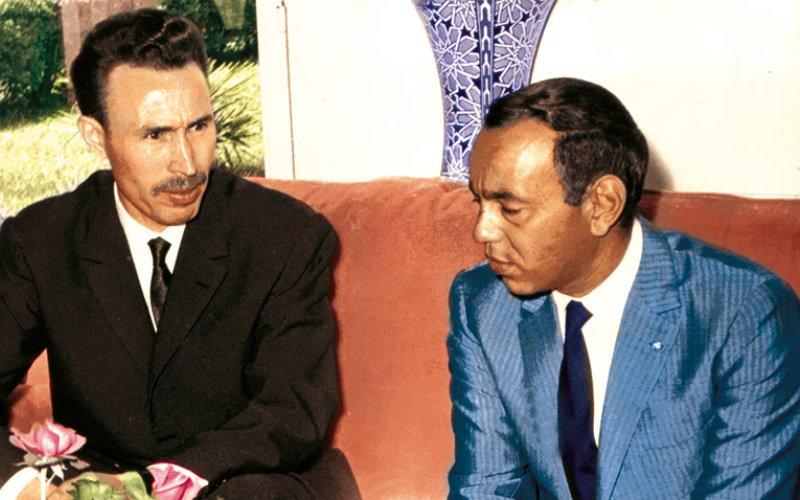Morocco-Algeria Rift Deepens: King’s Peace Overtures Fall on Deaf Ears

Despite the outstretched hand constantly renewed by King Mohammed VI, particularly during the traditional Throne Day speech, relations between Morocco and Algeria are struggling to normalize.
"The Algerian people are a brotherly people who are linked to the Moroccan people by centuries-old human and historical ties, particularly through language, religion, geography and a common destiny," said King Mohammed VI to Algeria during his traditional Throne Day speech on July 29 last. A hand he continues to extend to Algiers, especially since the latter has unilaterally severed its relations with Rabat. But Algeria has never grasped this outstretched hand. "While diplomatic relations between Rabat and Algiers were officially broken off in August 2021 on the initiative of the Algerian Republic, they had seriously begun to smolder 50 years ago, in the aftermath of the Madrid Accords, which marked the end of the Spanish presence in the Sahara," explains geopolitical analyst and senior reporter John Mackenzie in an article titled Why relations between Morocco and Algeria are at a standstill, published by Revue Conflits.
He recalls that this text led to the effective sharing of the administration of the territory between Morocco and Mauritania. "In fact, the control that Madrid then exercised over this part of the desert as a colonial state was transferred to the young Mauritania and restored to the Sherifian Kingdom as part of this tripartite resolution," recalls John Mackenzie. The only problem: the Polisario Front, an armed separatist organization opposed to the Spanish presence in the region and supported since its creation by Algeria, is not mentioned in these agreements. "The existence of an autonomous Sahrawi state, as the Polisario calls for, is, de facto, not recognized," he indicates. This is the first point of tension. "In reaction, the movement enters into war in the wake against Mauritania and Morocco for control of the region and proclaims in 1976 the creation of the "Sahrawi Arab Democratic Republic", an entity not recognized to this day by the UN and many countries."
The armed conflict began in 1975. "Between the Polisario Front and Nouakchott, the war did not last long, Mauritania having abandoned all territorial claims on this part of the Sahara in 1979, the weapons were laid down 4 years after the start of the war. But with Morocco, the clashes continued for 26 years. The entry into force of a ceasefire built under the aegis of the UN in 1991 marks the end of this open war between Rabat and the Sahrawi independentists without a lasting territorial solution being found," the geopolitical analyst recalls again. 16 years later, Morocco proposes an autonomy plan for the Sahara under its sovereignty. Presented in 2007, this plan has been supported by many countries in order to resolve this dispute. In 2020, the United States, under the Trump I administration, recognized the Moroccanness of the Sahara as part of the Abraham Accords and the normalization of relations between Morocco and Israel.
"To date, more than 116 countries support the Moroccanness of the Sahara," Mackenzie specifies. "But for Algiers, the resolution of this territorial conflict on the terms of Rabat - autonomy of the southern provinces under the sovereignty of Morocco - is not acceptable." This is also one of the points of friction between Paris and Algiers. "When the Kingdom made the choice to revive relations with the French Republic, 22 agreements worth 10 billion euros were signed in October 2024 during Emmanuel Macron’s state visit. In the wake, the French Development Agency announced that it was considering mobilizing 150 million euros in investments in the Sahara in the Dakhla-Oued Eddahab region," the geopolitical analyst also specified.
The tensions between Rabat and Algiers have undermined the Arab Maghreb Union (AMU), a body created in 1989 and joined by the 5 Heads of State of the region at a summit in Marrakech. "One of the major achievements of this organization remains the signing of trade and customs agreements with the adoption of the Maghreb Free Trade Convention in 1996, aimed at facilitating trade relations between member states," Mackenzie says, but "its implementation remains very limited, if not non-existent." According to him, "an improvement in relations between Morocco and Algeria would pave the way for new economic, agricultural or security cooperation that the Maghreb needs to see big."
Related Articles
-

Morocco Cracks Down on Rampant Misuse of State Vehicles by Officials
9 September 2025
-

Morocco’s New License Plates Spark Nationwide Controversy: Drivers Fined for Legal Tags
8 September 2025
-

Severe Weather Alert: Thunderstorms and Gusty Winds to Batter Multiple Moroccan Regions
8 September 2025
-

Ryanair Flight Fiasco: Passengers Stranded in Rabat as Plane Lands in Fez Without Them
8 September 2025
-

Drought Threatens Morocco’s Ancient Argan Forests, Risking Ecological Disaster
8 September 2025